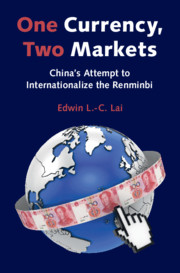Book contents
- One Currency, Two Markets
- One Currency, Two Markets
- Copyright page
- Dedication
- Contents
- Figures
- Tables
- Boxes
- Preface
- Acknowledgments
- A Short Summary of This Book
- Abbreviations
- 1 Introduction
- 2 China’s Aversion to a Floating Exchange Rate
- 3 Why Does China Want to Internationalize the RMB?
- 4 China’s Strategy of Internationalizing the RMB
- 5 The Importance of Capital Account Liberalization
- 6 The Importance of Financial Sector Reform
- 7 The Importance of the Offshore RMB Market
- 8 The Potential of the RMB as a Payment Currency
- 9 The Prospects of RMB Internationalization
- References
- Further Reading
- Index
5 - The Importance of Capital Account Liberalization
Published online by Cambridge University Press: 17 June 2021
- One Currency, Two Markets
- One Currency, Two Markets
- Copyright page
- Dedication
- Contents
- Figures
- Tables
- Boxes
- Preface
- Acknowledgments
- A Short Summary of This Book
- Abbreviations
- 1 Introduction
- 2 China’s Aversion to a Floating Exchange Rate
- 3 Why Does China Want to Internationalize the RMB?
- 4 China’s Strategy of Internationalizing the RMB
- 5 The Importance of Capital Account Liberalization
- 6 The Importance of Financial Sector Reform
- 7 The Importance of the Offshore RMB Market
- 8 The Potential of the RMB as a Payment Currency
- 9 The Prospects of RMB Internationalization
- References
- Further Reading
- Index
Summary
In Chapter 5, the importance of capital account liberalization is discussed. I explain how the “coalescing effect” and “thick market externalities” effect determine the use of a currency for trade invoicing and denominating financial assets and use the theory to explain why capital account opening, in addition to financial development and the size of the economy, is essential to RMB internationalization. I ask two questions: Given that capital account opening carries risk, should China open its capital account just because it want to internationalize the RMB? Do the benefits of capital account opening outweigh the costs of it regardless of whether China pursues RMB internationalization? To answer these questions, I discuss the benefits and costs of capital account liberalization, including the loss of exchange rate stability due to the open-economy trilemma. I explain the theoretical basis of the trilemma and the empirical evidence for it. I then point out that there is a positive feedback effect between capital account opening and financial market reform. Thus, the initiative to internationalize the RMB, which calls for capital account opening, can set forth a chain reaction that facilitates capital account opening and the financial market in tandem in a gradual and interactive manner.
Keywords
- Type
- Chapter
- Information
- One Currency, Two MarketsChina's Attempt to Internationalize the Renminbi, pp. 95 - 137Publisher: Cambridge University PressPrint publication year: 2021

